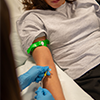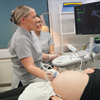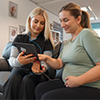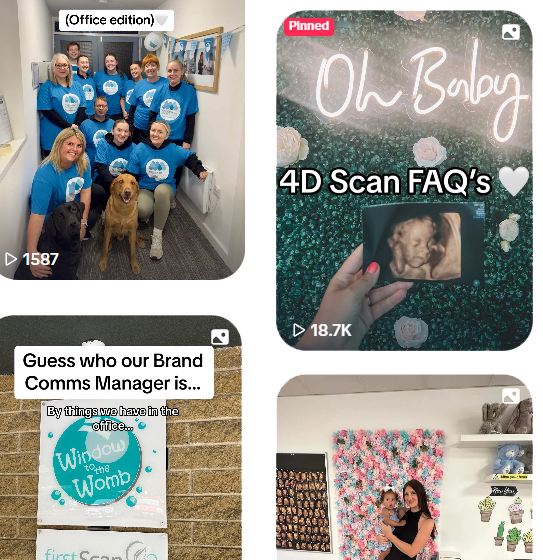What Are the Early Signs of Pregnancy?
For those hoping to become parents, recognising the early signs of pregnancy can be exciting but sometimes a bit uncertain. Early pregnancy symptoms can vary from person to person and are sometimes similar to pre-menstrual symptoms, making them easy to miss. Here’s a look at some of the most common early pregnancy signs, plus guidance on confirming your pregnancy and what to do if you think you might be expecting.
1. Missed Period
One of the most telltale signs of early pregnancy is a missed period. If your cycle is regular and your period is late, this may be a reason to take a pregnancy test. However, some women may still experience light bleeding or spotting in early pregnancy, often referred to as implantation bleeding, which occurs as the embryo attaches to the uterus.
For more details, the NHS provides guidance on missed periods and when to take a pregnancy test.
2. Nausea and Morning Sickness
Nausea, often called “morning sickness,” is a common early sign of pregnancy, though it can actually occur at any time of the day. This typically begins around the 4th to 6th week of pregnancy. Some women experience mild nausea, while others may have more intense symptoms.
Learn more about managing nausea in pregnancy with NHS guidance on morning sickness.
3. Tender, Swollen Breasts
Hormonal changes in the early weeks of pregnancy can make your breasts feel sore, sensitive, or heavier than usual. This symptom is similar to pre-menstrual tenderness but usually intensifies as pregnancy hormones increase.
4. Fatigue and Tiredness
Feeling unusually tired is another common symptom in early pregnancy, often beginning as early as the first week after conception. Increased levels of the hormone progesterone and the body’s adjustments to support a growing baby can make you feel fatigued.
5. Frequent Urination
During early pregnancy, hormonal changes increase blood flow to your kidneys, causing your bladder to fill more quickly. This can lead to frequent urination, a symptom that can start as early as two weeks after conception and continue throughout pregnancy.
6. Mood Swings
Mood swings caused by hormonal shifts can also occur in early pregnancy. Many women feel more emotional or have sudden highs and lows similar to PMS as their bodies adjust to pregnancy hormones.
7. Food Cravings or Aversions
Sudden changes in your sense of taste and smell are common in early pregnancy. You might find yourself craving certain foods or feeling repulsed by others that you used to enjoy. These changes can occur very early, sometimes even before a missed period.
8. Mild Cramping and Spotting
Light cramping or spotting around the time of your expected period can also be an early sign of pregnancy. Known as implantation cramps, this mild discomfort occurs as the embryo attaches to the uterine wall. However, if cramping is severe or accompanied by heavy bleeding, it’s important to contact a healthcare provider.
9. Elevated Basal Body Temperature
If you’ve been tracking your basal body temperature (BBT) as part of your fertility awareness, you might notice that it stays elevated if you’re pregnant. BBT typically rises slightly after ovulation and stays higher if conception has occurred.
10. Metallic Taste
Some women experience a strange metallic taste in their mouths during the early weeks of pregnancy due to hormonal changes. This unusual symptom often goes away after the first trimester but can be an early sign that’s easy to overlook.
Confirming Your Pregnancy
If you’re experiencing any of these early signs, a home pregnancy test is the most accurate way to confirm pregnancy. Most tests are accurate around the time of your missed period, though some tests detect pregnancy even a few days earlier. For confirmation, consider scheduling an early scan with Window to the Womb. Our clinics offer ultrasound scans as early as 6 weeks—or two weeks from your first positive test—providing a reassuring confirmation and the chance to see your little one as they start to develop.
When to Contact Your GP
If you suspect you’re pregnant or are experiencing unusual symptoms, it’s a good idea to reach out to your GP or midwife. They can confirm your pregnancy and offer advice on what to expect during the early weeks. Additionally, if you experience any pain or heavy bleeding, it’s essential to seek medical advice to ensure everything is progressing healthily.
The NHS provides detailed guidance on early pregnancy symptoms and when to seek help.
Enjoy the Journey
While early pregnancy symptoms can be a roller coaster, each pregnancy is unique and can be a beautiful journey. If you’re experiencing early signs and would like confirmation, consider an early scan with Window to the Womb for a reassuring start. Support and resources are available to guide you through each step of this exciting new chapter.













 Packages & Prices
Packages & Prices  Important Info & Policies
Important Info & Policies  Your Scan
Your Scan